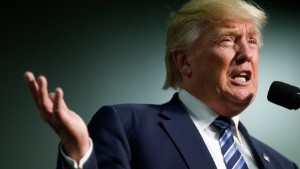
It might seem as though Republican presidential nominee Donald Trump is moving further away from the party that nominated him. Since he declared himself “unshackled” he’s escalated his maverick rhetoric, hammering home his claims that the November 8 election is “rigged” against him.
Cornered by a flood of accusations of sexual assault, Trump’s Fifth Avenue headquarters has become an unlikely fort from which he’s staging a last stand against an ever-widening circle of enemies that includes not only the media and his Democrat opponent, Hillary Clinton, but much of the GOP. “100% fabricated and made up charges … may poison the minds of the American voter. FIX!” he tweeted on October 15.
Trump’s attempts to delegitimize our upcoming election should make clear what many Americans have known all along: He represents a clear and present danger to American democracy.
From the inception of his campaign, he’s explicitly reached out to that American underworld where alt-righters, conspiracy theorists, survivalists and anti-government militants breed. He’s not only been firm in his commitment to the Second Amendment, but has incited violence in explicit and coded ways against a long list of internal enemies — and Hillary Clinton. It’s hard to forget the sight of him mimicking shooting a gun while saying last month that Clinton could shoot somebody and get away with it.
For anti-government and gun rights activists — groups with significant overlaps — Trump’s the man, and the election the occasion, for them to play out their hand. Trump has specifically courted these constituencies from his very first general campaign ad, in which a member of a citizen militia is seen along with police and border patrol officers. Back then Trump had the support of most of the Republican elite, who saw nothing amiss in this representation of their party’s agendas.
Trump has encouraged his fans to exploit open and concealed carry laws as they target those whose appearance indicates they might vote the “wrong way”; there’s talk of coups, violent uprisings and assassinations. In Virginia, a man recently stalked the campaign office of Democrat Jane Dittmar for 12 hours. He told reporters that exposing his gun was a means of “providing a voice” to closeted Trump supporters.
In this heated atmosphere, the Federal Bureau of Investigation foiled an alleged plot by three members of a pro- “sovereign citizen and anti-government” group to blow up a Muslim-inhabited apartment complex in Kansas. Meant as a message of protest to Americans, the terror attack was scheduled for November 9.
Voter security and free elections are among the primary criteria for democracy worldwide, and have always been at the heart of America’s reputation as a “land of the free.” So it’s a very sad commentary on our country that the Organization for Security and Co-Operation in Europe, which monitors elections worldwide, is observing three presidential elections: Moldova, Bulgaria and the United States. Here, it’s deploying 10 times the number of observers (more than 400) than it did in 2012, chiefly in response to the group’s assessment of the threat posed by Trump’s candidacy.
Top Republicans seemed to finally be acknowledging the gravity of the situation. Trump’s running mate, Indiana Gov. Mike Pence, stated that “we will absolutely accept the results of the election.” And House Speaker Paul Ryan made his own stab at quelling the “rigged election” theory, stating that he’s “fully confident” the election will be conducted “with integrity.” Yet he delivered his message through a spokesperson rather than speaking directly to the American people, as one would hope a leader in a time of national emergency would see fit to do. And most importantly, Ryan did not rescind his formal support of Trump as GOP candidate.
Meanwhile, Trump fans the flames further, attributing the firebombing of the GOP’s North Carolina office on October 16 to “animals representing” Clinton and state Democrats, even though the investigation is still underway.
The puzzling continued endorsement given Trump by Ryan and Republican National Committee chairman Reince Priebus makes sense if one thing is considered. Trump, unshackled, is still drawing on two core components of the GOP playbook: encouraging anti-government sentiment while facilitating the citizen access to arms, including those of military caliber. The Republican leadership has refused for years to reckon with the national security threats posed by this toxic combination. This election has made the extent of that threat crystal clear.
No wonder Trump’s a nightmare for many conservatives right now: His followers who talk of violent uprisings surrounding the election merely expose the long-minimized subversive core of the Republican Party. Whatever the results on November 8, the GOP — what will be left of it — has some serious soul-searching to do.
As reported by CNN
